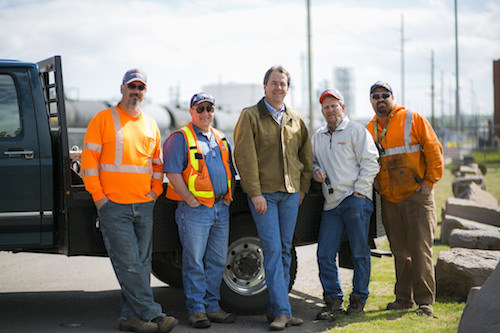When Montana voters cast their ballots on Tuesday, they may also determine the fate of the state’s labor climate.

|
| Montana Gov. Steve Bullock, center, has been working families’ best defense against a right-to-work law in the state. Photo credit: Bullock campaign.
|
Montanans will choose their governor this cycle, with incumbent Steve Bullock facing Greg Gianforte, a businessman and political newcomer. They will also choose their lone member of Congress and decide on a ballot initiative that could impact state funding for projects including infrastructure spending.
Embedded in the gubernatorial race is the fate of right-to-work in the state, said Helena, Mont., Local 233 Business Manager Keith Allen.
“We’re surrounded by right-to-work states, and anti-union forces want to take us out,” said Allen, who is also the state political coordinator. “But Montana is different, at least it has been.”
Labor allies are not likely to regain control of the state Legislature this election cycle, said Allen. It will remain poised to pass right-to-work legislation, which is why the governor’s race is so important.
“Gov. Bullock is our best defense against right-to-work,” Allen said. “It’s his veto pen that protects us.”
Prior to his election as attorney general eight years ago and governor four years ago, Bullock was a labor lawyer, including for Local 233. He helped to get $106,000 in back pay for Intralot employees when they organized, Allen said. Intralot is the vendor for the Montana Lottery.
Gianforte, by contrast, has either refused to state an opinion on right-to-work, or said that it wouldn’t be a priority.
“You know who else said that? Scott Walker,” Allen said, referring to the governor of Wisconsin who signed right-to-work legislation early in his term despite claiming otherwise. “Gianforte has basically given a green light to the Republicans who want to pass right to work.”
Gianforte also refused to meet with the Montana AFL-CIO, something that no recent candidate has done, Allen said.
At the congressional level, Rep. Ryan Zinke is facing a challenge from Denise Juneau, the state superintendent of public instruction and a union member. Zinke, who has a 29 percent rating from the AFL-CIO, voted to fast-track the TPP and supports right-to-work, according to the National Right to Work Committee.
“I knew Zinke back when he was a moderate Republican in the state Legislature. He always told us he would oppose things like right-to-work,” Allen said. “But now that he’s in Congress, he’s leap-frogged over to the right wing of the party.”
Juneau and Bullock have been endorsed by the IBEW State Conference of Electrical Workers and the AFL-CIO.
“I will always stand side by side with Montana workers,” Juneau said at a Labor Day picnic.
If elected, Juneau would be the first Native American to serve in Congress and the second woman to represent Montana.
“It’s going to be tough to win,” Allen said. “But if enough voters turn out, Juneau can beat him.”
Also on the ballot is an initiative to use state funds for medical research. If it passes, it would create a biomedical research authority that could request up to $20 million a year for 10 years through state bonds.
Local 233 joined other labor organizations, state legislators and groups including the Montana Taxpayers Association to petition the state Supreme Court to have it removed from the ballot saying it’s unconstitutional.
“It takes state money out of legislators’ hands with no oversight,” Allen said, adding that, based on the way it’s written, the initiative could override the state’s prevailing wage law since the money will go to private entities with no requirement to follow prevailing wages.
“The initiative is full of feel-good words, but the devil’s in the details,” Allen said.
The court allowed the initiative to remain on the ballot but did not rule on the issue itself. If it passes, it could be challenged at that time, reported the Billings Gazette.
IBEW members have been phone banking and canvassing with AFL-CIO. So far, Montana unions have knocked on about 55,000 doors, Allen said.